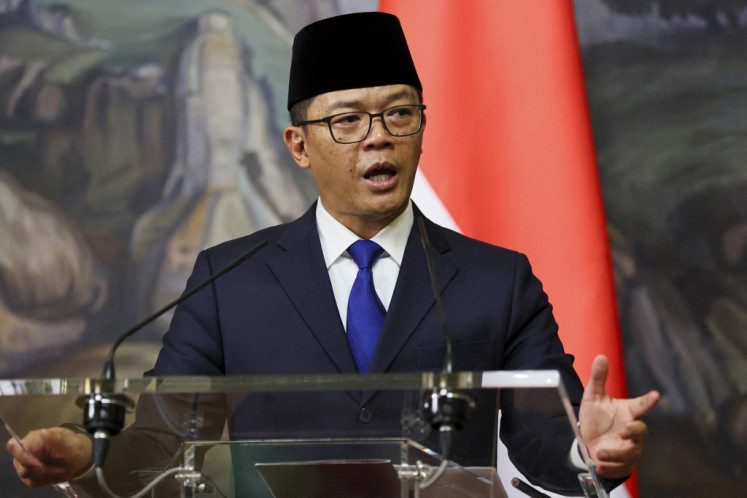Popular Reads
Top Results
Can't find what you're looking for?
View all search resultsPopular Reads
Top Results
Can't find what you're looking for?
View all search resultsRI urged to end dirty fuel use to fight climate change
Indonesia, along with every other country, needs to put an end to the use of low-octane fuel and shift to clean energy as part of the country’s commitment to addressing climate change
Change text size
Gift Premium Articles
to Anyone

I
ndonesia, along with every other country, needs to put an end to the use of low-octane fuel and shift to clean energy as part of the country’s commitment to addressing climate change.
The shift to using clean energy is viable according to a multi-country presentation on climate change during the Annual Meetings of International Monetary Fund-World Bank Group in Nusa Dua, Bali.
Nicholas Stern, co-chairman of the Global Commission on the Economy and Climate initiative, called on all governments, including Indonesia, to take decisive action to address climate change, including reducing its consumption of dirty fuel.
“[Governments need to] avoid subsidizing dirty [fuel] and, instead, do the opposite to price carbon and move to mandatory disclosure of climate-related financial risks,” he said in his remarks for an event hosted by the National Development Planning Agency (Bappenas) on “low-carbon development and the green economy” on Thursday.
The economics professor at the London School of Economics further said the measures must be taken quickly amid global growth in a number of sectors, such as infrastructure, which is forecast to double in the next 15 years and the world economy, which will also double in the next 20 years.
“Seizing the benefits will be possible only if we act boldly over the next two or three years to take the key decisions that will shape the coming decades,” he said.
Stern further said measures to bring about a sustainable growth trajectory were possible with the help of unprecedented opportunities in four sectors, namely innovation, high-quality and sustainable investments, greater resource productivity and the vitality and potential of the private sector.
Separately, WB president Jim Yong Kim also emphasized the importance of addressing climate change for any country, developed or developing, during his remarks at the IMF-WB press briefing on Thursday.
“Climate change is an existential threat to global development and efforts to end poverty. [...] We have far less time than we thought and far less urgency than we need,” he said in a written remark received by The Jakarta Post.
Indonesia, through its state energy holding company Pertamina, still sells dirty gasoline called Premium, which has the lowest research octane number (RON) of 88. Many other countries have dumped this type of fuel years ago and the automotive industry mostly produces vehicles that cannot run on this kind of fuel.
Besides ensuring the availability of Premium in the country, the government indirectly also still subsidizes the fuel from the pockets of state firm Pertamina. Pertamina has to bear a cost of around Rp 1,000 (6 US cents) per liter (with an assumption of the Indonesian Crude Price at around $47 to $51 per barrel oil).
Indonesia contributes 5.3 percent of total global carbon emissions, according to the government’s data. The country has actually committed to cutting greenhouse gas emissions by 29 percent by 2030 and has also ratified the Paris Agreement, of which one of the goals is to keep the increase in global average temperatures to well below 2 degrees Celsius above pre-industrial levels, two years ago.
To realize these commitments, Bappenas has presented the nation’s low-carbon development plan, which will not sacrifice economic growth, such as through renewable energy, during the IMF-WB meetings with the aim of attracting green investment.
The policies of all ministries to reduce carbon emissions have been put together in the national mid-term development plan (RJPMN), which will be discussed again with whoever is president after the April election.
“Low-carbon development and the green economy are keys to further boosting economic growth without sacrificing environmental sustainability and social inclusivity,” Bappenas head Bambang Brodjonegoro said in his remarks for the parallel event.
Meanwhile on specific matters to reduce the use of fossil fuel, Bambang was confident the upcoming RJPMN, which includes low-carbon emission schemes, is enough to bind all ministries, including in the energy sector.









